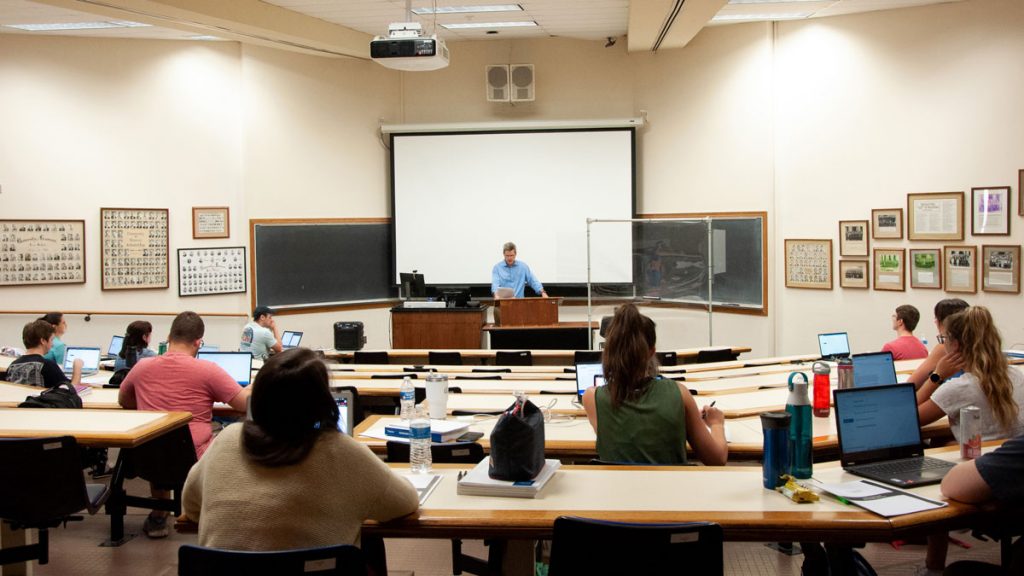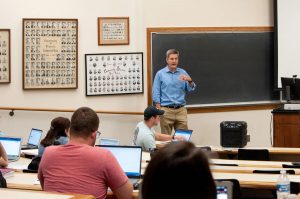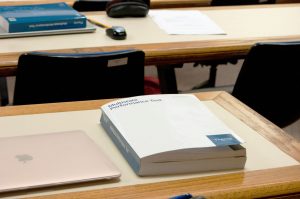
For law graduates, passing the bar examination is the final hurdle to clear before starting a legal career. In almost all jurisdictions, the two-day, timed test includes six hours of writing and 200 multiple-choice questions administered under strict conditions.
This summer, KU Law students got a practice run of those conditions during an in-person simulated bar exam at Green Hall. The simulated test is part of KU Law’s Free Bar Prep Program.

Samantha Natera, L’21, signed up for the simulated exam to practice day-of conditions and work on timing. The event helped Natera get used to limiting her time responding to Multistate Performance Test (MPT) questions. The MPT tests lawyering skills in 90-minute segments.
“I wanted to have the experience of taking the simulated exam so I could know how it was to do it under exam conditions, and work on my timing and reading comprehension,” Natera said.
Natera was among about 40 students who took a two-day, simulated bar exam in early July. Spread out over two classrooms and several study rooms, students had a chance to take an exam under similar conditions to what they would face later in the month for the July bar examination.
Free Bar Prep Program resources
Now in its third year, the Free Bar Prep Program offers students a free, post-graduation bar preparation course in partnership with Themis Bar Review. Leading up to graduation, students also have access to a Multistate Professional Responsibility Examination preparation course, an elective course focusing on bar prep, and diagnostic exams starting in their 1L year.
The program aims to enhance students’ ability to succeed in law school and on the bar exam without the adding expense of a post-graduation prep course, said Leah Terranova, KU Law assistant dean for academic and student affairs.
“By removing the financial pressure of paying for a bar prep course, our graduates can focus more squarely on readying themselves for the exam,” Terranova said. “This is especially important for those graduates who have not yet secured post-graduate employment, and who might otherwise forego taking on the large expense of a bar prep program.”
Throughout the summer, bar preparation instructor Glenn Jewell is available as a resource and to answer questions. With the law school’s student affairs and career services offices, Jewell hosted coffee meetups at Green Hall this summer to check in with graduates as they worked through their bar prep course.
During the spring semester, Jewell teaches an Extended Bar Exam Preparation elective course. Open to 3Ls, the course is designed to ensure students know what to expect from both the post-graduation Themis bar review course and the bar exam.
Students also take diagnostic exams through the Themis portal during their first year. The multiple-choice exams give students early, formative feedback on their understanding of 1L course materials tested on the bar exam.
Advice for graduating law students
Falling behind in the bar prep course can cause graduates anxiety, Terranova said. Jewell addresses that anxiety by tracking weekly progress for each student and offering support to those who have fallen behind, along with a personalized plan to help bring them back up to speed.
“The best things folks can do for themselves is to put personal plans aside for the summer and dedicate their full time and attention (right from the start!) to preparing for the bar exam,” Terranova said.
Graduates often underestimate the amount of time it takes to study for the bar exam, especially given the amount of memorization required, Terranova said. Themis recommends starting 10 weeks before the exam date and clocking 50 hours of studying each week.
“They should expect this summer to be comprised of the hardest, most exhausting work they’ve done so far in their law school career. If they go in expecting this, they’ll be ready for the challenge,” Terranova said.
Terranova advises third-year law students to trust the Themis program. “Graduates need to know it will be grueling at times; they will be exhausted by the sheer volume of work,” she said. “But, if they follow the study guide that Themis as charted and meet the metrics laid out by Themis, they will set themselves up for success on the exam.”
— By Margaret Hair
